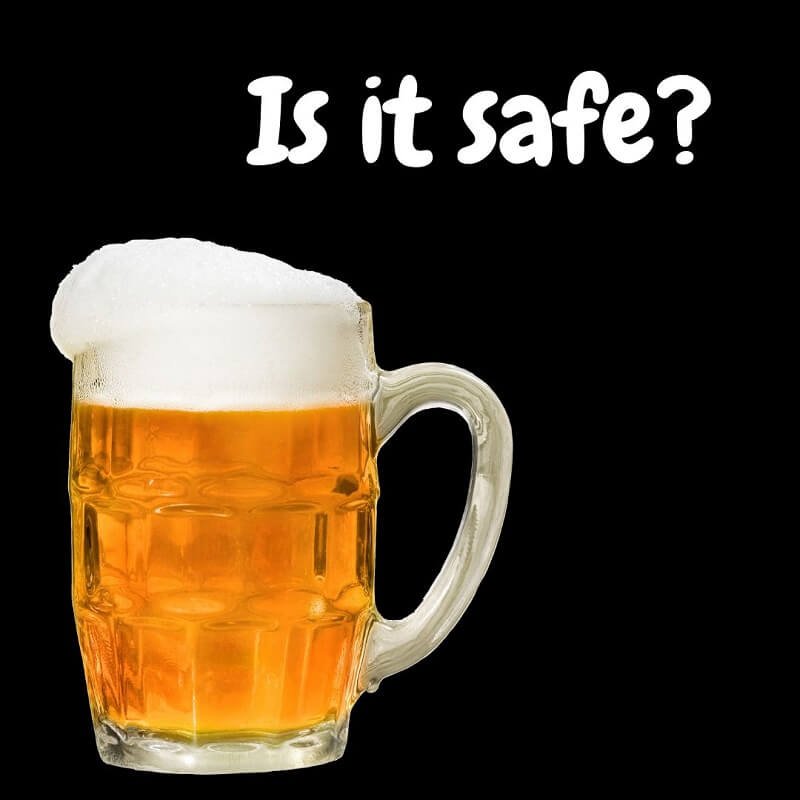
There will always be concerns about health whenever people are exposed to a new thing and that’s rightfully so. Homebrewing differs from commercial brewing and we have all heard stories about the dangers of ethanol in distilled alcohol and how it could seriously hurt you.
Well, if you have such questions on your mind that bother you and prevent you from enjoying homebrew boozes like beer, mead, ciders, or wine, let me calm you by explaining how things really are.
Homebrew can’t hurt your health, except for people allergic to yeast which can cause an allergic reaction. Fermented brews have been consumed for centuries, and no harmful bacteria can exist in homebrew, except if the sanitization wasn’t properly done it could ruin the taste of a brew and make it undrinkable.
You see, our ancestors survived on brews like beer and wine because such alcoholic fermented brews are a perfect way to resist harmful bacteria and other pathogens that could otherwise thrive in water.
If you worry about how the yeast in homebrew affects your health, you may find out that it’s actually good for you.
Can you get food poisoning from homebrew?
It’s easy to tell if homebrew booze is fresh and healthy or spoiled just by sniffing it and if you would feel a vinegary or sulfuric taste it would mean the homebrew is spoiled.
However, there are no dangerous bacteria like salmonella, escherichia coli, or any similarly dangerous pathogen that can exist in homebrew.
Not only that during the brewing process, the boiling of a wort kills anything potentially harmful, but during fermentation, the yeast colonies are so powerful that they are known to kill other bacteria if found on their way. Moreover, a smart homebrewer will always sanitize their equipment, so there’s not much that can go wrong.
Furthermore, once the fermentation is complete, the alcohol produced will offer an additional layer of protection.
In case the homebrew is somehow infected, such bacteria may ruin the taste of a brew but it won’t have an impact on your health unless you continue to drink a whole gallon of such spoiled brew and get diarrhea.
I do, however, understand that a spoiled brew could cause irritation in people with a low immunity system or a sensitive stomach, but even in such cases, it’s difficult to claim that spoiled homebrew could do any serious harm to the health.
If you are not worried about bacteria in your tea bags, there’s no need to worry about bacteria in homebrew for as long as it tastes and smells good which is extremely easy to spot.
If homebrew doesn’t smell bad and doesn’t have nasty off-flavors, it’s good and safe for consumption!
Can the alcohol in homebrew make you sick?
During fermentation, the yeast eats sugars from malts, honey, or any other source that is a part of the recipe and transforms them into alcohol and CO2.
The alcohol produced is called ethanol and depending on the recipe and duration of fermentation the alcohol content in homebrew can vary from 3.5% to 18% or sometimes even more.
However, most yeast used in homebrewing will struggle to go beyond 18% ABV due to the alcohol tolerance in which it can work.
Most home-brewed beers and ciders range from 5% to 8%, but it’s usual for mead to range between 9% to 18%.
Regarding the alcohol percentage, homebrews are safe for consumption and there’s no way that alcohol found in mentioned homebrews can make you sick besides making you drunk if you drink too many delicious boozes.
You can’t go blind from homebrew
We’ve all heard the stories about methanol and how it could make people blind but it simply doesn’t exist in homebrewed boozes like beer, mead, ciders, and similar brews.
These “dangerous” alcohols exist in distilling only because any hard drink like vodka, whisky, cognac, or gin needs to go through a process of distilling to achieve high levels of ABV in which dangerous alcohols form so they need to be filtered out.
The 35 ABV%+ hard drinks are not created in a process of fermentation, but rather through a process of distilling which follows after the fermentation.
So, for instance, if you want to make whisky, you’ll first need to brew corn and ferment its sugars into some alcohol with the help of yeast (15% ABV or so) before you can start the distilling process and get to those high ABV percentages.
Homebrew can be healthy in moderation
Hops have anti-inflammatory properties, vitamin B is great for bone density, and some herbs come with special health benefits that you probably didn’t know about and much more.
I was quite surprised about the health benefits of homebrew when consumed in moderation, so I went on a drunken spree and haven’t posted anything to this blog for a month.
Yeah, it’s a joke, life hits you with responsibilities and you simply can’t live that Charles Bukowski lifestyle any longer, but you can still enjoy your drinks in moderation.
Truth be told, you shouldn’t drink alcoholic drinks for health benefits because it never ends with two glasses of wine per week.
Therefore, you can explore other low-ABV fermented drinks like kombuchas! Kombucha is a fermented tea and has between 0.5 to 3% alcohol at most, making it a great candidate for a refreshing daily drink with many health benefits.
